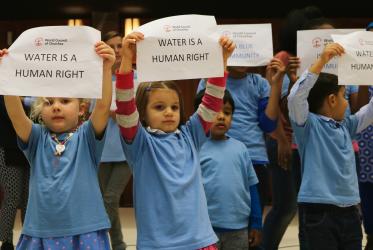Displaying 1 - 20 of 21
WCC Eco-School begins in Crete
15 November 2023
Ukraine: Responding to humanitarian need
08 September 2022
Scottish and UK religious leaders call for urgent climate action
20 September 2021
Rethinking Ecological Relationships in the Anthropocene era
11 - 13 February 2021
Churches should use their voice on climate change
26 February 2020
WCC moderator speaks at Justice Conference in Norway
09 November 2018
Assisi: On the ecumenical pilgrimage into a more sustainable future
03 September 2018
G7 must address famine
22 May 2017
Winners of WCC photo contest announced
09 May 2016
Tveit on the “Ten Commandments” of food
26 January 2016
Land rights focus of panel discussion
17 November 2015
Pilgrimage for climate justice continues in Norway
04 August 2015













